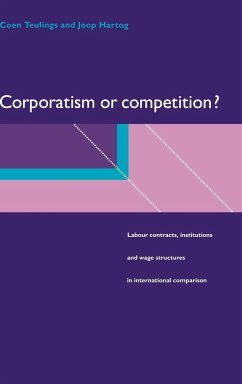The authors present important new research showing that corporatist institutions generate smaller non-competitive wage differentials than a decentralised system. A theoretical explanation is developed based on the hold-up problem in investments, arguing that corporatist institutions solve the problem by specifying ex ante nominal contracts that remove the necessity of ex post bargaining over the surplus of an employment relationship. The authors also argue that such institutions allow sufficient flexibility to accommodate aggregate shocks, even more so than decentralised systems. Corporatism or Competition? is the first book to bring together the mass of research on comparative wage differences, wage movements and employment behaviour in different countries with different institutional frameworks, in an organised and coherent fashion.
Table of contents:
Preface; Symbols and other conventions; Synopsis; 1. What we observe and what we claim; 2. The role of corporatism in models of surplus sharing; 3. Beliefs, norms and institutions; 4. Union behaviour; 5. Wage differentials and rent sharing; 6. Tenure profiles and wages; 7. Unemployment and wage flexibility; 8. Inside corporatism: how the Dutch play their own game; 9. An assessment: competition or corporatism; References; Index.
Teulings and Hartog examine the phenomenon of corporatism from a fresh and innovative perspective. Blending a wide-range of theoretical models with original research material, the authors have a clear and provocative thesis that corporatist institutions have a positive role, enhancing efficiency in the labour market.
The importance of labour market institutions to labour market outcomes, corporatist versus de-centralised.
Hinweis: Dieser Artikel kann nur an eine deutsche Lieferadresse ausgeliefert werden.
Table of contents:
Preface; Symbols and other conventions; Synopsis; 1. What we observe and what we claim; 2. The role of corporatism in models of surplus sharing; 3. Beliefs, norms and institutions; 4. Union behaviour; 5. Wage differentials and rent sharing; 6. Tenure profiles and wages; 7. Unemployment and wage flexibility; 8. Inside corporatism: how the Dutch play their own game; 9. An assessment: competition or corporatism; References; Index.
Teulings and Hartog examine the phenomenon of corporatism from a fresh and innovative perspective. Blending a wide-range of theoretical models with original research material, the authors have a clear and provocative thesis that corporatist institutions have a positive role, enhancing efficiency in the labour market.
The importance of labour market institutions to labour market outcomes, corporatist versus de-centralised.
Hinweis: Dieser Artikel kann nur an eine deutsche Lieferadresse ausgeliefert werden.








